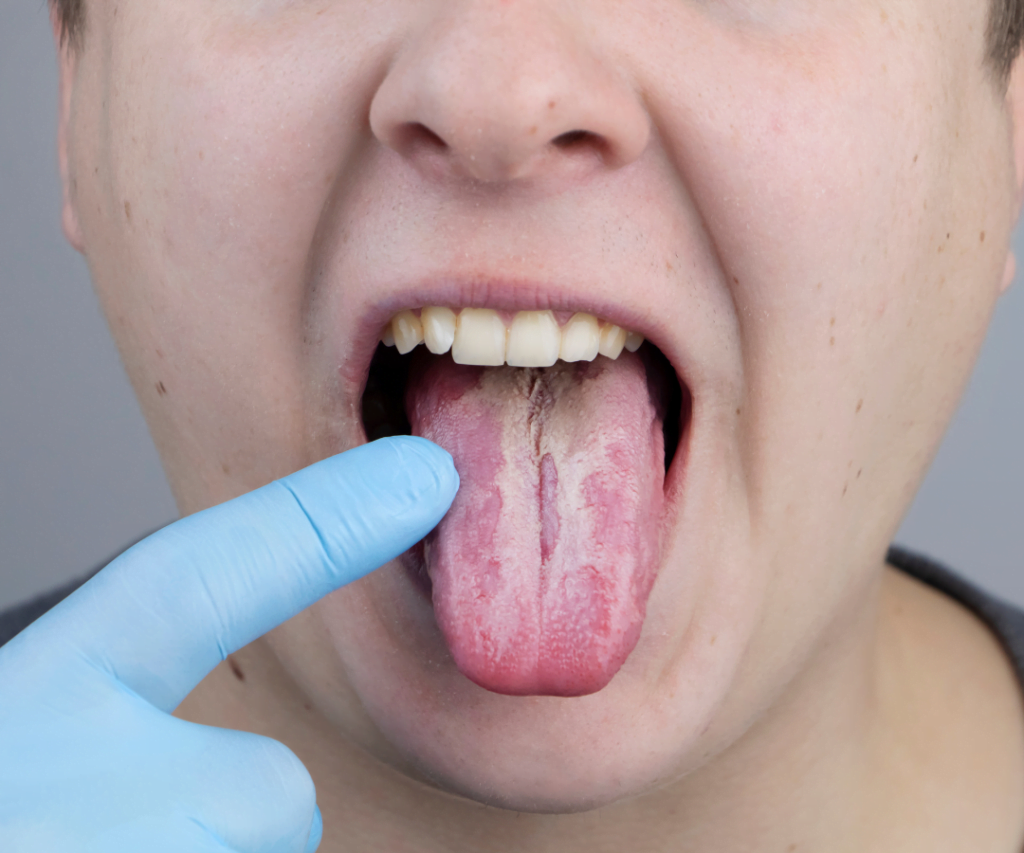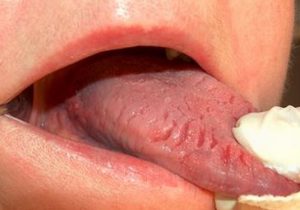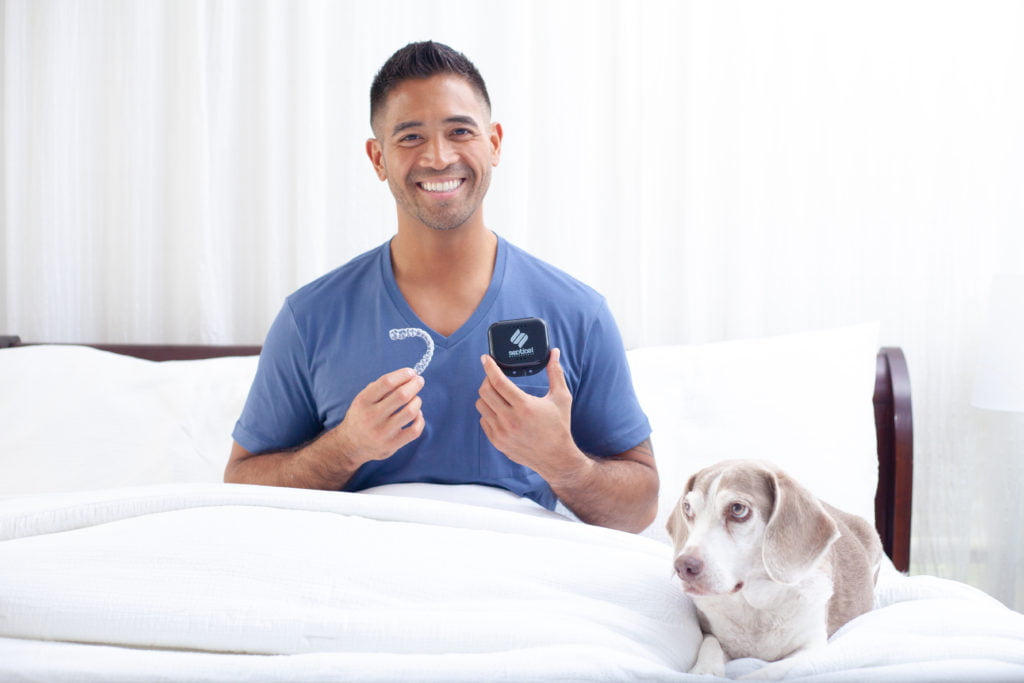Why Am I Biting My Tongue in My Sleep?
Medically reviewed by: Sharon Boyd, MA, BS, RDH
“I bite my tongue” is a phrase that is commonly heard from many individuals, and it refers to the act of unintentionally biting down on the tongue. It can happen to anyone, and there are several reasons why it occurs.
However, while it may seem like a harmless habit, it can lead to issues that can cause discomfort and pain. In this article, we will explore the reasons why individuals bite their tongue, issues that can occur, and how they can stop the action.
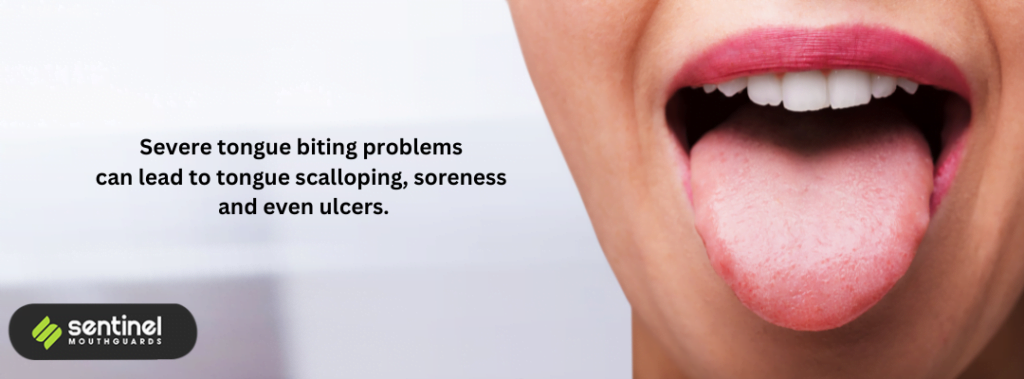
Why do I bite my tongue?
Common Causes and Contributing Factors
- Nervousness and Anxiety
One of the most common reasons why individuals bite their tongue is due to nervousness and anxiety. This can happen during times of stress, such as before a presentation, a job interview, or even in social situations. It can also happen during sleep if someone is having a nightmare or experiencing a stressful dream.
- Bruxism
Bruxism is a condition where an individual grinds or clenches their teeth, and it can occur during the day or at night. If someone is clenching their teeth too tightly, they can bite their tongue unintentionally. Bruxism is often associated with stress and anxiety, and it can also lead to other dental problems such as jaw pain and tooth sensitivity.
- Malocclusion
Malocclusion refers to a misalignment of the teeth, which can cause an individual to bite their tongue unintentionally. This can happen when someone has crooked or crowded teeth, and it can also happen when someone has an overbite or underbite.
- Medication Side Effects
Some medications can cause side effects such as dry mouth or muscle spasms, which can lead to unintentional tongue biting. This is especially common with medications that are used to treat neurological conditions such as Parkinson’s disease or epilepsy.
In addition to stress and anxiety, several other factors can contribute to nocturnal tongue biting. Dehydration is one such culprit, as it can lead to a dry mouth, making the tongue more prone to being inadvertently bitten during sleep.
Furthermore, individuals suffering from temporomandibular joint disorder (TMJ), a condition affecting the jaw joint and surrounding muscles, may experience involuntary movements or spasms during sleep, resulting in tongue biting incidents.
All of which are typically involved in involuntary tongue biting.
Rare causes of tongue biting:
Geniospasm
Geniospasm is a relatively rare genetic movement disorder characterized by involuntary contractions of the mentalis muscle, the one that controls movement of your chin and lower lip.
Facial mandibular myoclonus
Referred to as an epilepsy imitator in a study published in October 2020, Facial mandibular myoclonus (FMM) is a rare sleep disorder characterized by involuntary jerks of the muscles responsible for chewing and facial expressions. These jerks typically occur during sleep and can lead to a specific problem: recurrent tongue biting.
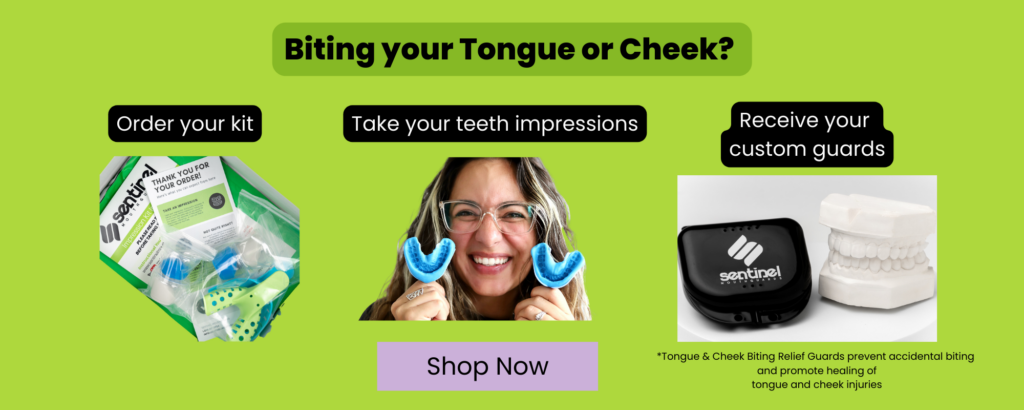
How can malocclusion cause me to bite my tongue?
Malocclusion, or misalignment of the teeth, can contribute to unintentional tongue biting during sleep in several ways:
- Overcrowding: When there is not enough space in the mouth for all the teeth to align properly, overcrowding can occur. This may lead to the tongue getting caught between misaligned teeth, increasing the likelihood of biting during sleep.
- Protrusion of Teeth: If certain teeth protrude or are positioned at an unusual angle, the tongue may be more prone to getting trapped between them during sleep. This can result in accidental biting.
- Crossbite or Overbite: Conditions such as crossbite (upper teeth inside the lower teeth) or overbite (upper teeth significantly overlap the lower teeth) can create situations where the tongue is more likely to be in the wrong place, increasing the risk of biting.
- Dental Shifts: Changes in tooth alignment due to factors like tooth shifting or movement can create new spaces or gaps where the tongue may inadvertently end up, leading to tongue biting.
It’s essential to address malocclusion not only to prevent tongue biting but also for overall oral health. A dentist can evaluate the extent of misalignment and recommend appropriate treatments, which may include orthodontic interventions such as braces or clear aligners to correct the alignment of the teeth. If you’re experiencing issues related to malocclusion, it’s advisable to consult with a dental professional for a thorough assessment and personalized recommendations.
How can teeth grinding (bruxism) cause me to bite my tongue?
Teeth grinding, or bruxism, is a condition where an individual clenches or grinds their teeth involuntarily, often during sleep. Bruxism can contribute to unintentional biting of the tongue in several ways:
- Tongue Placement: During episodes of teeth grinding, the tongue may be positioned between the upper and lower teeth. As the grinding forces the teeth together, the tongue can get caught in the crossfire, leading to accidental biting.
- Muscle Tension: Bruxism is often associated with increased muscle activity in the jaw and facial muscles. The heightened muscle tension can cause movements that result in the tongue coming into contact with the teeth, leading to the risk of biting.
- Jaw Movements: The repetitive and forceful jaw movements associated with bruxism can cause the tongue to move inadvertently. If the tongue is not properly positioned within the mouth, it may be more susceptible to getting bitten during the grinding episodes.
- Sleeping Position: Individuals who grind their teeth may change their sleeping position during the night. As a result, the tongue may shift, making it more prone to being bitten when teeth grinding occurs.
To address bruxism and reduce the risk of biting the tongue, dental professionals often recommend the use of a custom-fitted night guard. A night guard creates a protective barrier between the upper and lower teeth, preventing direct contact and reducing the potential for tongue biting during sleep.
When should I be worried about biting my tongue?
Signs of Concern and When to Seek Professional Advice
If you find yourself frequently biting your tongue, it’s essential to be aware of signs that may indicate a need for professional advice. Consider the following:
- Frequency and Severity: If tongue biting occurs frequently or becomes more severe over time, it may be a cause for concern.
- Persistent Pain or Swelling: Persistent pain or swelling after tongue biting episodes could indicate an underlying issue that requires attention.
- Difficulty Eating or Speaking: If tongue biting interferes with your ability to eat, speak, or perform daily activities, it’s advisable to seek professional advice.
- Recurrent Injuries: Regularly experiencing injuries to the tongue may suggest an underlying dental or oral health problem that needs evaluation.
- Changes in Oral Health: Any noticeable changes in your oral health, such as increased sensitivity, should prompt a visit to a dental professional.
Severe tongue biting problems can lead to tongue scalloping, soreness and ulcers. If you observe these signs, it’s recommended to consult with a dentist. They can assess the situation, identify potential causes, and recommend appropriate measures to address any underlying dental issues contributing to tongue biting. Seeking professional advice ensures that you receive the necessary guidance and treatment for optimal oral health.
Protecting Your Tongue During Sleep Using Tongue & Cheek Biting Relief Mouth Guards
Sentinel Mouthguards’ Tongue & Cheek Biting Relief Mouth Guards are designed to provide effective protection against tongue and cheek biting during sleep. These mouth guards work by creating a physical barrier between the upper and lower teeth, preventing direct contact and greatly reducing the risk of accidental biting.
Here’s how they work:
- Customized Fit: Sentinel Mouthguards’ guards are custom-made based on impressions of your teeth. This ensures a precise and comfortable fit, tailored to the unique contours of your mouth.
- Material Selection: The guards are crafted from high-quality materials, which is gentle on the teeth and gums. The soft and flexible material helps to absorb the impact, providing a cushioning effect.
- Thin Design: These guards have a slim design, providing comfort while minimizing the impact of any unintentional biting.
- Easy to Wear: Sentinel Mouthguards’ Tongue & Cheek Biting Relief Guards are designed to be comfortable and easy to wear during sleep. The custom fit ensures that they stay securely in place throughout the night.
- Durable Construction: These guards are made to withstand the wear and tear of nightly use. The durable construction ensures longevity and effectiveness in preventing tongue and cheek biting over time.
By utilizing Sentinel Mouthguards’ Tongue & Cheek Biting Relief Guards, individuals can experience a tailored and effective solution to protect against the consequences of bruxism and tongue biting during sleep.
-
Product on sale
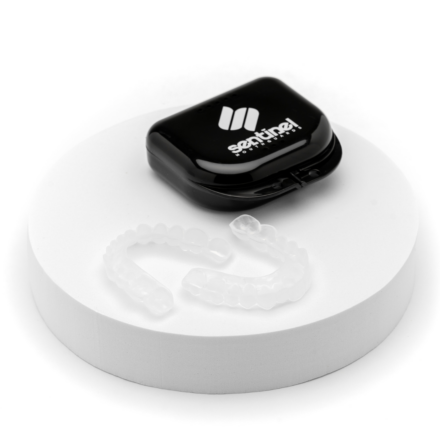 Tongue and Cheek Biting Relief Mouth GuardsOriginal price was: $189.00.$169.00Current price is: $169.00.
Tongue and Cheek Biting Relief Mouth GuardsOriginal price was: $189.00.$169.00Current price is: $169.00.
What causes a person to keep biting their tongue?
There are several potential causes for a person to keep biting their tongue. Here are a few possible reasons:
- Accidental Biting: Tongue biting can occur accidentally while eating or talking. Sometimes, due to rapid movements or misalignment of the jaw, a person may inadvertently bite their tongue. This can be more common in situations where someone is in a hurry or distracted.
- Dental Issues: Dental problems such as misaligned teeth, malocclusion (improper bite), or sharp edges on the teeth can increase the likelihood of biting the tongue. These issues can affect the positioning of the tongue within the mouth, making it more susceptible to getting caught between the teeth during certain movements.
- Sleep-Related Disorders: Some sleep disorders, like bruxism (teeth grinding) or sleep apnea, can lead to tongue biting during sleep. These conditions may cause involuntary muscle movements or tongue thrusting, which can result in biting the tongue.
- Oral Habits or Nervous Tics: Certain oral habits or nervous tics, such as tongue thrusting or repetitive tongue movements, can increase the chances of accidentally biting the tongue. These habits may be subconscious and occur during periods of stress, anxiety, or concentration.
- Medications or Medical Conditions: Certain medications can cause dry mouth or altered sensation, increasing the likelihood of tongue biting. Additionally, medical conditions such as Parkinson’s disease or Tourette’s syndrome, which can cause involuntary movements, may contribute to tongue biting.
How do I stop biting my tongue?
Stopping the habit of biting your tongue may require a combination of awareness, behavioral changes, and, in some cases, professional assistance. Here are some tips to help you stop biting your tongue:
- Identify Triggers: Pay attention to situations or activities that trigger tongue biting. Stress, anxiety, or certain habits may contribute to the behavior. Identifying triggers can help you address the root cause.
- Practice Mindfulness: Stay mindful of your oral habits, especially during stressful moments or times of distraction. Being aware of the behavior is the first step in breaking the habit.
- Relaxation Techniques: Incorporate relaxation techniques into your routine to manage stress. Deep breathing, meditation, or yoga can help reduce anxiety and decrease the likelihood of tongue biting.
- Oral Exercises: Some people find that performing oral exercises, such as tongue exercises or consciously keeping the tongue in a specific position, can help break the habit of biting.
- Chew Gum: Chewing sugar-free gum can provide an alternative oral activity and help redirect the impulse to bite the tongue. It also promotes jaw movement and may alleviate stress.
- Consult a Dentist: If tongue biting persists despite your efforts, consider consulting a dentist. They can assess your oral health, identify any contributing factors, and recommend appropriate interventions, such as a custom-fit night guard.
- Address Dental Issues: If misalignment of the teeth (malocclusion) is contributing to the tongue biting habit, orthodontic treatment or other dental interventions may be necessary to correct the underlying issue.
- Behavioral Therapy: In some cases, behavioral therapy or counseling may be beneficial, especially if tongue biting is linked to underlying psychological factors. A mental health professional can help explore and address these issues.
Remember, breaking habits takes time and persistence. If you find it challenging to stop biting your tongue on your own, seeking professional guidance can provide valuable insights and tailored strategies to address the behavior effectively.
Why does my tongue hurt?
Common Causes and Remedies for Tongue Pain
- Cut on tongue
Sometimes we suffer an injury to the tongue separate from biting it.
Have a cut on your tongue? Depending on the severity of the cut, you may need to seek emergency help. If the cut is not so severe, here are some suggestions for treatment:
- cold compress
- saltwater solution (mix 1 tsp of salt to 1 cup of warm water) rinse
- honey is a natural antibacterial. Rub honey directly on sore area up to 3x per day
- coconut oil. Swish coconut oil around in your mouth for several minutes per day
- wearing a set of soft mouth guards on both the upper and lower teeth will prevent the teeth from damaging the area further and allow for the wound to heal.
Avoid any spicy or acidic food as it can worsen tongue soreness
- Nocturnal seizures (nighttime seizures)
Nocturnal Seizures (Nighttime Seizures)
Having seizures during the night can lead to involuntary biting of your tongue. If a person has
chronic seizures, they are more likely to experience biting on parts of the tongue, especially
the edges. Since seizures can cause muscle tension and jerking movements, it’s common
for these individuals to experience self-induced injuries as part of their episode. Tongue biting is a common symptom in people suffering from seizures.
Individuals suffering from nocturnal seizures may not seem to have any other symptom during
the daytime hours, making it harder to determine the cause of their tongue injuries. However,
the condition can be diagnosed by observing their brainwaves. Prescription medication is the
primary treatment for this medical disorder.
More on Nighttime Tongue Biting
Nighttime tongue biting is a problem that can be painful, lead to constant sores, and leave you feeling frustrated all day long. Everyone has bitten their tongue at one point or another, but it’s typically accidental (and happens when you’re eating or talking.) It’s also normal to occasionally bite
it while you’re sleeping. Having a large tongue or misaligned teeth can make you more susceptible.
But habitual nighttime tongue biting can lead to chronic problems.
How common is it to be a tongue chewer?
Tongue chewing, also known as morsicatio linguarum, is considered a relatively uncommon habit. It is estimated that tongue chewing affects a small percentage of the population, although the exact prevalence is not well-documented. This behavior can manifest as repetitive chewing or biting of the tongue, often without an apparent cause or trigger.
Some people are never aware of it but deduct what’s going on because of the chronic sores and pain. Determining the underlying cause can be difficult, especially if it’s linked with some type of
disease or illness. Working with your dentist and/or doctor can help you determine if the habitual injuries are due to something like bruxism, epilepsy, or sleep apnea. What are the statistics of each?
What damage can occur from excessive tongue biting?
1. Visible marks and/or scars along the lateral borders (sides) ofyour tongue that’s
called Morsication lingarum.
2. Bleeding due to constant trauma from the biting edges of your teeth.
3. Sores or “ulcers” on your tongue or an infection on tongue
4. A generally sore tongue
I bite my tongue while I’m eating. What can I do?
If you frequently bite your tongue while eating, there are several steps you can take to minimize the occurrence of this problem:
- Slow down and be mindful: Take your time while eating and pay attention to the food in your mouth. Avoid rushing through your meals, as this can increase the chances of accidentally biting your tongue.
- Chew carefully: Make a conscious effort to chew your food thoroughly before swallowing. Take smaller bites and ensure that the food is adequately broken down before moving it around in your mouth.
- Be cautious with tough or chewy foods: Some foods, such as steak or hard candies, can be more challenging to chew and increase the risk of biting your tongue. Exercise caution when consuming these types of foods and be extra mindful of your tongue’s position.
- Modify your eating habits: Adjust your eating techniques to minimize the chances of biting your tongue. For example, try cutting your food into smaller, bite-sized pieces that are easier to manage.
- Visit a dentist: If you frequently bite your tongue while eating, it may be worth seeing a dentist to evaluate your oral health. They can examine your teeth and jaw alignment, identify any potential issues that may contribute to tongue biting, and recommend appropriate treatments or interventions.
- Maintain good oral hygiene: Keeping your mouth healthy can help reduce the likelihood of accidental tongue biting. Regularly visit your dentist for check-ups and cleanings, and maintain a consistent oral hygiene routine of brushing your teeth twice a day and flossing daily.
One of the most effective prevention methods for tongue biting is to wear soft custom-made night guards on both the upper and lower teeth. Please note, these guards are not to be worn while eating or drinking. Rather, wear the guards when not eating or drinking to allow the damaged areas to heal.
Can the cheaper, one size fits all mouth guards at the drugstore protect my tongue?
Over-the-counter night mouth guards do not provide a perfect fit, which can potentially cause further tissue irritation. You can visit your dentist in person to take dental impressions, create a mold, and then send it to a dental lab for a mouth guard tailored specifically for your bite. Although custom, this is the most expensive route. For a more affordable alternative, you can make your night guard purchase online.
How do I heal my cut tongue fast?
Sometimes, we bite our tongue while chewing, talking or eating. If you’ve experienced damage to your tongue, cheeks, or lips because of tongue biting, there are steps you can take to ease discomfort and minimize further damage.
Saltwater Rinse
As long as there are no open wounds, consider rinsing with warm saltwater. Simply mix one teaspoon of table salt in a tall glass of warm water then rinse with it until you’ve used most of the
solution. Saltwater helps to draw out inflammation, reducing swelling so that you’re less prone to re-bite those swollen areas.
For a temporary numbing action, you can hold a piece of ice against the area for a few seconds to reduce pain and soreness.
Try to avoid spicy foods until your tongue heals.
Most importantly, to prevent further damage, invest in soft dental night guards to wear on both your upper and lower teeth. These soft, very thin guards are unobtrusive and easier to sleep in. For the best level of comfort and protection, you want a guard set that’s
custom fitted to your mouth.
The best way to prevent tongue biting problems is by treating the cause. Or, taking steps to prevent
those sources from happening in the first place.
Treatment for Rhythmic Disorder
Cognitive behavior therapy (CBT) with a licensed professional counselor is recommended for treating some types of sleeping disorders. Fortunately for people who suffer from rhythmic movements, symptoms usually disappear as the person gets older. If not, pharmacological treatment
could be necessary.
Treatment for Seizures.
If your nighttime tongue biting is caused by seizures, the normal course of treatment should be prescribed by a medical doctor. Medications can reduce the frequency and severity of seizures. If treated successfully, the treatment will consequently prevent tongue-biting.
Treatment for Daytime Bruxism
Bruxism tends to be habitual. For daytime grinding and clenching, cognitive behavior therapy can be
beneficial. Especially since anxiety and everyday stress are major causes of bruxism. Feeling more
relaxed can reduce the chances of clenching your teeth together. Wearing a day mouth guard will also be beneficial in protecting your teeth and tongue.
-
Product on sale
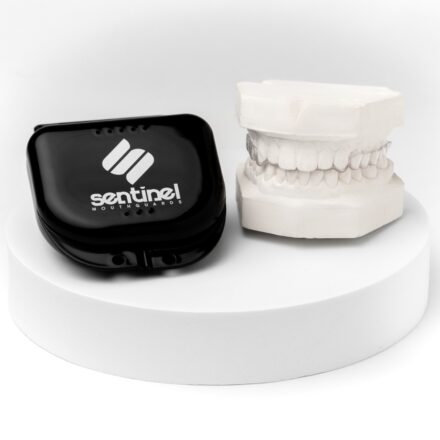 No-Show Day Mouth GuardOriginal price was: $149.00.$129.00Current price is: $129.00.
No-Show Day Mouth GuardOriginal price was: $149.00.$129.00Current price is: $129.00.
Conclusion
In conclusion, overcoming the habit of biting your tongue requires a multi-faceted approach that encompasses awareness, behavioral changes, and, if necessary, professional assistance. By identifying triggers, practicing mindfulness, and incorporating relaxation techniques, individuals can take proactive steps toward breaking the habit.
The use of Sentinel Mouthguards’ Tongue & Cheek Biting Relief Guards and maintaining good oral health habits can contribute to the overall success of overcoming tongue biting. If persistent, consulting a dentist is advisable, as they can assess oral health and identify contributing factors.
Remember, breaking habits is a gradual process, and persistence, along with a comprehensive approach, is key to achieving long-term success in stopping the habit of biting the tongue. If you would like to learn more about Sentinel Mouthguards’ products and services, visit our help center today!
This article was last updated on May 2024 to reflect the latest research on tongue biting during sleep

